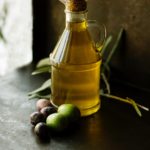Does eating fat make you fat?
No! Fat does not make you fat
Lately I have spoken with a few clients and other people in my life who still believe that eating fat will make them fat. This is a reasonable assumption, but this could not be further from the truth as dietary fat and body fat are very different things.
Why do we fear fat?
Fat was first labelled as ‘bad’ in the 1950s, when it was hypothesised that a rise in saturated fat intake was responsible for a rise in cardiovascular disease and heart attacks. Unfortunately it wasn’t recognised at the time that a rise in sugar consumption was actually causing these health conditions. Many people still believe that fat is bad and therefore eat a low-fat and high-carb diet. This results is obesity, type 2 diabetes, high cholesterol and many other conditions.
It can be tricky to change your beliefs, but here’s why you should stop fearing fat.
Dietary fat is an essential nutrient that is required by body. In fact, every cell in the body is surrounded by a membrane of fat molecules. Fat is also important for brain function, joint health, the absorption of vitamins, the production of hormones, nerve signalling, and gut health.
How the body processes fat and sugar
Good liver function is essential for the breakdown of dietary fat. The liver produces bile which is stored in the gallbladder, and released when fat is consumed. This emulsifies the fat and allows the body to use it for energy.
Sugar, on the other hand, is converted to fat in the body. What’s more, high blood sugar from processed foods causes insulin levels to rise. Insulin is a hormone which allows sugar to enter body cells and be used as fuel. But constant high levels of insulin cause insulin resistance, where the body is no longer able to respond to the hormone. This means that blood sugar levels rise, which causes weight gain – especially on the stomach area and diabetes.
Interestingly, eating a small amount of good quality fat with a meal or snack prevents insulin from spiking too high.
The good, the bad, and the ugly
When it comes to fat, quality matters. Here are the fats to include in your diet:

- High-quality saturated fats such as organic grass-fed butter and coconut oil. These are readily absorbed into the blood stream for clean energy, without being stored as fat in the body.
- Monounsaturated fats which help to regulate blood sugar, body weight and blood pressure. They are found in foods such as olives, avocado, pork, beef, macadamias, almonds, egg yolks and butter.
- Omega-3 polyunsaturated fats which benefit brain health and combat inflammation, heart disease, diabetes, depression and joint pain. They are found in salmon, sardines, herring, mackerel, anchovies, chia seeds, flaxseeds and walnuts.
- Omega-6 polyunsaturated fats which are essential for growth and development as well as nerve impulse transmission. We can obtain the small amounts we need from fruits, vegetables, cereal grains and meat.
Here are the fats to steer clear of:
- Refined vegetable oils such as sunflower, canola, soybean and corn oil. These contain very large amounts of omega-6 fats which are harmful in excess. A healthy diet contains omega-3 and omega-6 fats at a ratio of approximately 1:1. A diet that is too high in omega-6 fats, however, leads to inflammation in the body and has even been linked to depression and cancer. If you have these in your cupboard – throw them out. Don’t even ‘use them up’. It’s just not worth it
- Transfats which are found in margarine and baked goods such as cakes, biscuits and cookies. They should be completely avoided as they cause inflammation, high cholesterol, insulin resistance and weight gain. Again – don’t even finish the container – just chuck them out.
The bottom line
Choose high quality fats and include a small amount with each meal. This will allow you to reap the health benefits of dietary fats, prevent your insulin levels from spiking, and keep you sated and help you to lose weight.
Good options include: half an avocado in your breakfast smoothie, a couple of poached eggs and a tablespoon of flaxseed oil with your salad, a small handful of raw unsalted nuts as a snack, or a salmon steak with steamed veggies for dinner.

